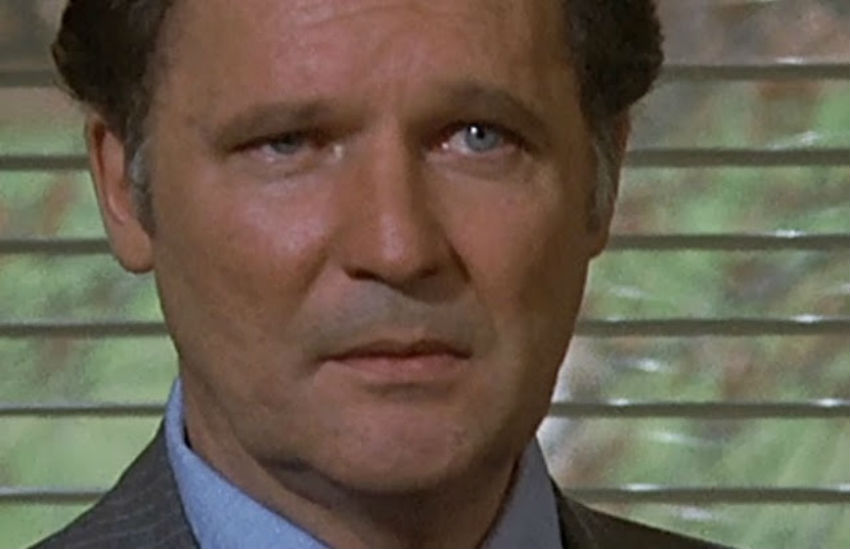 |
| "That foot is me!": Dean Vernon Wormer is the only one with any integrity in National Lampoon's Animal House. |
There is one moment of true pathos in
National Lampoon's Animal House (1978), and it lasts for exactly three seconds of the movie's 109-minute running time. This flicker of poignancy arrives near the end of the film during the climactic homecoming sequence. The members of the Delta Tau Chi fraternity, having been rightfully expelled from fictional Faber College for numerous disciplinary problems and an atrocious academic record, decide to get revenge on the institution's humorless, authoritarian leader, Dean Vernon Wormer (John Vernon) by crashing the school's prestigious homecoming parade. The frat brothers have converted a borrowed, totaled car into a fearsome, tank-like vehicle called the "Deathmobile," and they decide to simply ram this vehicle into the grandstand where the dean, his wife, and the town's mayor are standing.
In George Axelrod's pitch-black 1966 high school comedy
Lord Love a Duck, an act very similar to this (only perpetrated with a tractor) is treated as mass murder, and the perpetrator (Roddy McDowall) is hauled off to a mental institution for it. In
Animal House, there are no consequences for this attempt at vehicular homicide.
But never mind that.
What interests me is the dean's reaction right before the grandstand is demolished. He sees the Deathmobile, knows exactly what the Deltas are going to do with it, and instantly realizes that there is nothing he can do to stop it. That grandstand is going down -- and he with it. Throughout the movie, Dean Wormer has been in a constant state of agitation, always yelling and threatening and fuming. But there is no anger on his face at this moment, only sadness and exhaustion. Though no one is listening, he utters one of cinema's immortal lines:
"I hate those guys."
The line really works because you can tell that Dean Wormer genuinely means it. There is something tragic about him in this scene. Even though he is in a very public place when he says the line, this moment seems weirdly private, as if we're finally seeing him with his guard down.
And here's the damnedest thing:
he's not wrong. If I were attending Faber College in 1962, I'd hate the members of Delta House, too. I hate loud parties, people who cheat on exams, and even the smell of beer. When I watch
Animal House these days -- and I do so a few times a year, simply because I think the film is funny -- I find myself rooting for Dean Wormer more and more.
But, wait, isn't this a story about underdogs triumphing over adversity? No. No way. Not even close.
Simply put, the members of Delta House are
not underdogs. The inspiration for the film was a series of articles that Chris Miller wrote for
National Lampoon about his experiences at Dartmouth in the early '60s. Read that again:
Dartmouth. The magazine itself takes its name from the
Harvard Lampoon. Harvard and Dartmouth are not places where underdogs generally go to college. Ivy League schools are the sure dominion of
overdogs, not underdogs. These are privileged upper-middle-class and upper-class kids with well-connected mommies and daddies. The Deltas' only real "problem" is that they're not simply allowed to do whatever they want whenever they want. Plus, they've been given access to educational -- and, therefore, career -- opportunities that most kids will never have... and they couldn't give a shit. They never spend a solitary second studying, and they're all rewarded with great jobs at the end.
 |
| Kennedy & Nixon: Pretty boy and not-so-pretty boy. |
So what about Dean Wormer? Wasn't he based on Richard Nixon, one of the 20th century's great villains? Yes, he was.
As perverse as this will sound, I have developed a grudging respect for the deeply flawed, contradictory, and (yes) tragic figure of American politics that was Richard Nixon. I do not and cannot condone his views or actions, but I can admire the man's sheer determination and the tenacity that kept him going after several humiliating political defeats. When he ran unsuccessfully for the presidency and then lost his bid to become governor of California, Richard Nixon was considered "down and out" by most pundits. But he fought back, defied his detractors, and become President of the United States in 1968. It was one of the most remarkable comebacks in American political history.
Nixon worked harder than any man who ever held the office, and he made politics look like an Olympian ordeal. Nothing was ever given to him. He had to
earn it. You could see the strain in his face -- the sweaty upper lip, the furrowed brow, the five-o'-clock shadow, the jowls. In every conceivable way, he was the opposite of his one-time rival, John F. Kennedy, Jr. While Kennedy was born into one of America's most powerful families and was blessed with movie-star looks, Nixon was the son of a humble grocer and looked like a bridge troll in a cheap suit. Nixon, not Kennedy, was the underdog.
And so, in a way, is Dean Wormer. In my heart, I know I'm more like him than like any of the Deltas. Maybe that's why, every time I press "play" on my
Animal House DVD, I secretly hope that this will be the time when the beleaguered college official finally triumphs over the Deltas. He never will, of course, but we
true underdogs have to dream.











